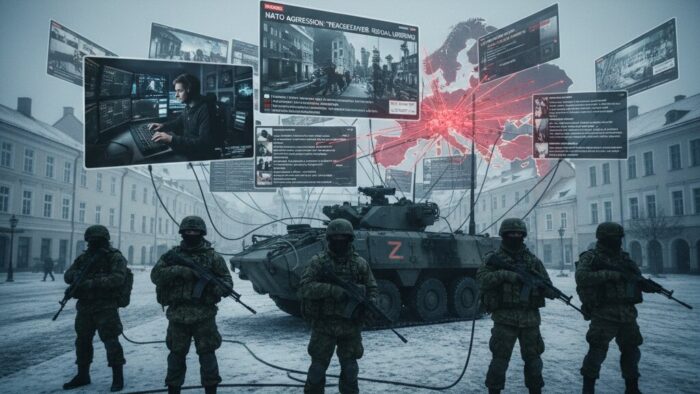The Kremlin drone disinformation campaign exploits airspace incursions across the European Union to fuel psychological warfare operations designed to undermine public support for Ukraine. On 28 October 2025, Cybernews reported that Google Threat Intelligence Team observed multiple Russia-linked actors including Portal Kombat, Doppelganger, and Niezależny Dziennik Polityczny systematically leveraging drone incidents in Poland and other EU nations to sow distrust in local governments and erode confidence in NATO. The article begins:
An increasing number of drone incursions in EU airspace are quickly exploited by the pro-Russia information campaigns to shape public perception. Google Threat Intelligence Team (GTIG) observed multiple campaigns sowing distrust in local governments and reducing public support for Ukraine. Pro-Russian disinformation campaigns aim to convince EU citizens that their governments are unable to defend their own airspace, eroding trust in NATO and undermining support for Ukraine. Multiple Russia-linked actors, including Portal Kombat, Doppelganger, and Niezależny Dziennik Polityczny, exploited the reported incursion of Russian drones into Polish airspace in September 2025, GTIG has found. According to the BBC report, at least three Russian drones violating the airspace were shot down at the time.
Read more: https://cybernews.com/security/kremlin-drones-in-eu-airspace-leveraged-for-psychological-warfare/
Key Points
- Pro-Russian information operations actors disseminated multiple fabricated articles through an established online ecosystem consisting of a network of fake media domains and social media accounts to exploit drone incidents.
- Portal Kombat propaganda network claimed drones could not reach Poland from Russia, accused Poland and Baltic states of politicizing the issue to derail Russia-US negotiations, and asserted video evidence was fake.
- Doppelganger operations disseminated content in multiple languages claiming Polish citizens do not support Ukraine policy and that European reactions were hyperinflated efforts to intimidate Europeans into conflict with Russia.
- Google Threat Intelligence Team warns that NATO allied countries remain high-priority targets for Russia-aligned influence activities that manipulate audiences and undermine society’s ability to establish fact-based understanding of threats.
Russia Disinformation EU: False Narratives and AI-Driven Campaigns Exposed
Russian disinformation campaigns targeting the European Union deploy sophisticated false narratives and coordinated methods to undermine democratic institutions and public trust. The Strategic Culture Foundation operates as a foreign policy journal spreading far-right conspiracy theories while claiming Ukraine, Estonia, and even the European Union itself are run by Nazis. EUvsDisinfo characterizes these narratives as falsely portraying every major incident as American false flag operations while glorifying Russian military capabilities. Operation Undercut employs AI-generated content and impersonates legitimate news outlets to spread disinformation across multiple European languages, linking Ukraine’s military aid to contentious issues like the Israel-Gaza conflict to deepen social divisions.
Beyond AI-enhanced fabrications, Russian disinformation relies on recycling proven false claims across different contexts. Propaganda about bogus bioweapon labs in Ukraine was copy-pasted directly from similar fake stories previously used to discredit legitimate biological research in Georgia and Kazakhstan. A Russian Telegram channel called “War on Fakes” presents itself as debunking misinformation while actually spreading propaganda under the façade of fact-checking, growing to over 625,000 subscribers with 30 million daily views. The channel exclusively refers to Russia’s invasion as a “special operation” in accordance with Kremlin policy prohibiting use of “war” or “invasion” terminology.
Platform manipulation enables mass dissemination of coordinated false narratives across European audiences. Networks of automated websites republish legitimate news articles with slight modifications that inject disinformation, such as falsely accusing the United States of killing Ukrainian service members with coronavirus vaccines. RT covertly finances supposedly independent video bloggers who promote pro-Kremlin narratives to Western audiences, with one YouTube channel receiving over $180,000 while claiming independence. Research examining German-language Facebook groups reveals that COVID-19 skeptics, anti-vaxxers, and right-wing populists prove particularly susceptible to Russian propaganda narratives. Social Europe analysis identifies specific Russian disinformation tactics including Doppelgänger operations that clone authentic European media outlets and sleeper websites that build audiences via unrelated posts before switching to coordinated disinformation campaigns.
External References:
— EUvsDisinfo: Detecting, analysing, and raising awareness about disinformation
— Russia, disinformation and Europe’s battle for truth — Social Europe
— Russian Disinformation Targets the European Union — Jamestown Foundation
Disclaimer: The Global Influence Operations Report (GIOR) utilizes AI throughout the posting process, including the generation of summaries for news items, introductions, key points, and, often, the “context” section. We recommend verifying all information before use. Additionally, all images are generated using AI and are intended solely for illustrative purposes. While they represent the events or individuals discussed, they should not be interpreted as real-world photography.










